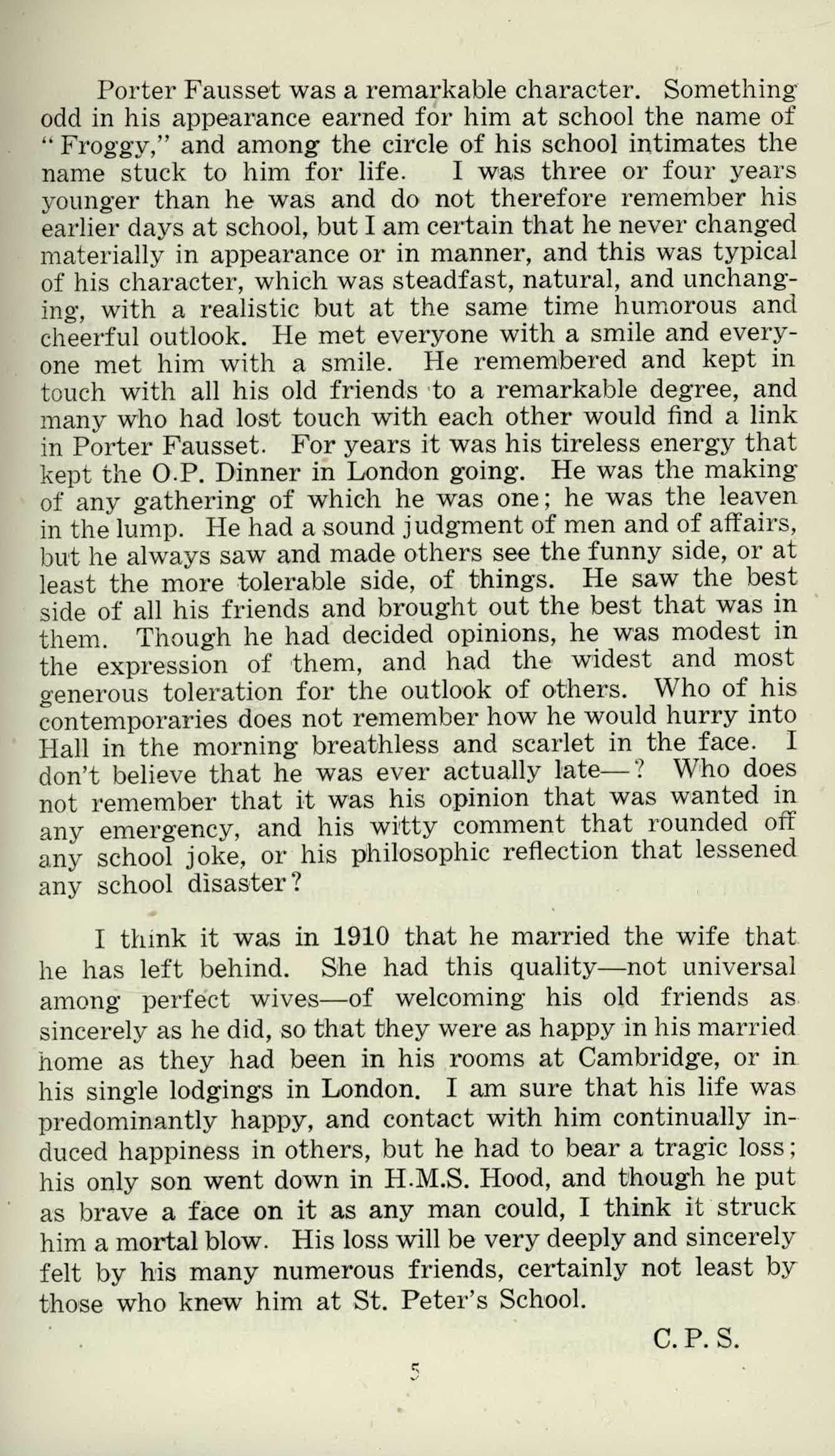
4 minute read
Obituary—Frederick Porter Fausset
from June 1942
by StPetersYork
FREDERICK PORTER FAUSSET (O.P.).
On the early morning of the 13th January of this year there died at his home at Moor Park, Hertfordshire, an Old Peterite who occupies a very special place in the memory of all who knew him, as I was privileged to do, at School, at his home in York, at Cambridge, and in London.
Frederick Porter Fausset was born in 1877, the son, by his second wife, of Canon Fausset, who was for many years Vicar of St. Cuthbert's and Canon of York Minster. The late Rev. William Yorke Fausset, O.P., sometime Headmaster of Ripon School and later of Bath College, was the elder of his two half-brothers, and Hugh I'Anson Fausset, the poet and literary critic, was his half-nephew.
Porter Fausset's career at school was one of classical scholarship and prize-winning. He won his form prize for classics in almost every form in the school from 1887 onwards, and 'the Archbishop's prize for classics in 1895 and 1896. He was a foundation scholar and a Hey scholar at school, and in 1896 went up to Peterhouse at Cambridge with a leaving Exhibition from the school and with a first classical scholarship at Peterhouse.
His feet at school, however, did not tread only the paths of learning, and he was a persistent runner in the Mile, in which he ran second in 1895, though I am not sure that he ever won it. He was also a most strenuous Rugby player, playing for the 1st XV in 1894/5 and in 1895/6. At Peterhouse he won the Classical Prize for his year in 1897, and won the Mile in his College sports in that year and again in 1899. He played Rugby for the College in 1896 and captained the side in 1899. He took 3rd Class Honours in the Classical Tripos, Part I, in 1899, and the same in the Law Tripos, Part II, in 1900. On coming down from Cambridge he was called to the Bar by the Inner Temple and joined the N.E. Circuit, but he was not really suited to practice at the Bar, and he soon abandoned it, and became one of the select band of Barristers who report cases for the Official Law Reports, and he followed this work to the end of his life. It seems only the other day that I saw him in his familiar seat in the Law Courts, and it is difficult to realise that I shall never see him there again. Such is the bald recital of the outward features of his life, but it is not for any of these things that he will remain in the affectionate memory of all who knew him.
Porter Fausset was a remarkable character. Something odd in his appearance earned for him at school the name of " Froggy," and among the circle of his school intimates the name stuck to him for life. I was three or four years younger than he was and do not therefore remember his earlier days at school, but I am certain that he never changed materially in appearance or in manner, and this was typical of his character, which was steadfast, natural, and unchanging, with a realistic but at the same time humorous and cheerful outlook. He met everyone with a smile and everyone met him with a smile. He remembered and kept in touch with all his old friends to a remarkable degree, and many who had lost touch with each other would find a link in Porter Fausset. For years it was his tireless energy that kept the O.P. Dinner in London going. He was the making of any gathering of which he was one ; he was the leaven in the lump. He had a sound judgment of men and of affairs, but he always saw and made others see the funny side, or at least the more tolerable side, of things. He saw the best side of all his friends and brought out the best that was in them. Though he had decided opinions, he was modest in the expression of 'them, and had the widest and most generous toleration for the outlook of others. Who of his contemporaries does not remember how he would hurry into Hall in the morning breathless and scarlet in the face. I don't believe that he was ever actually late—? Who does not remember that it was his opinion that was wanted in any emergency, and his witty comment that rounded off any school joke, or his philosophic reflection that lessened any school disaster?
I think it was in 1910 that he married the wife that he has left behind. She had this quality—not universal among perfect wives—of welcoming his old friends as sincerely as he did, so that they were as happy in his married home as they had been in his rooms at Cambridge, or in his single lodgings in London. I am sure that his life was predominantly happy, and contact with him continually induced happiness in others, but he had to bear a tragic loss ; his only son went down in H.M.S. Hood, and though he put as brave a face on it as any man could, I think it struck him a mortal blow. His loss will be very deeply and sincerely felt by his many numerous friends, certainly not least by those who knew him at St. Peter's School.

C. P. S.










